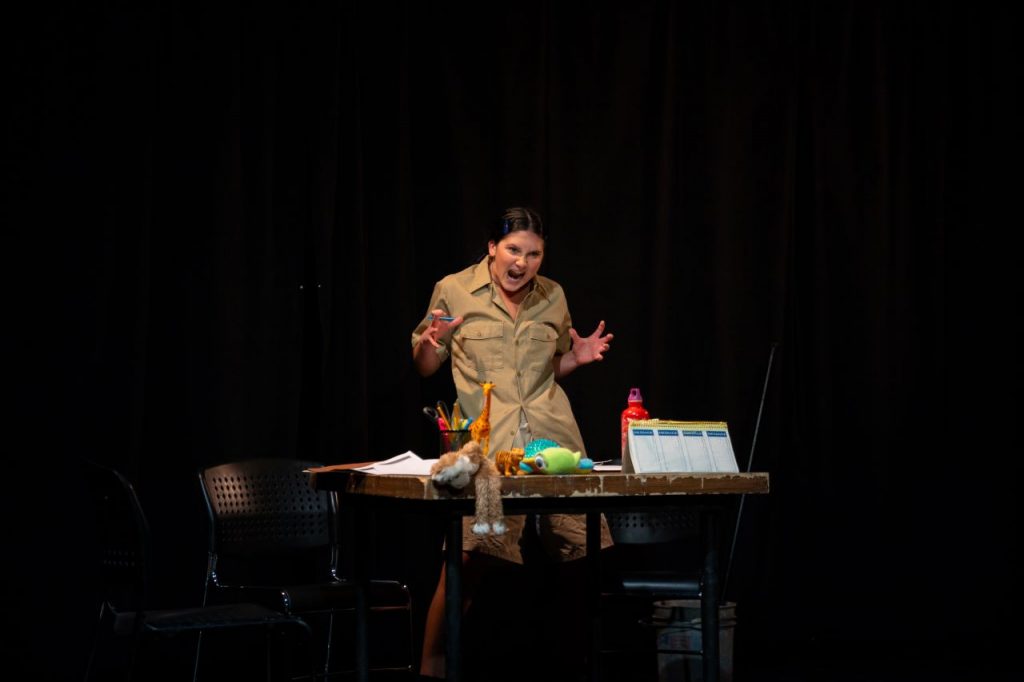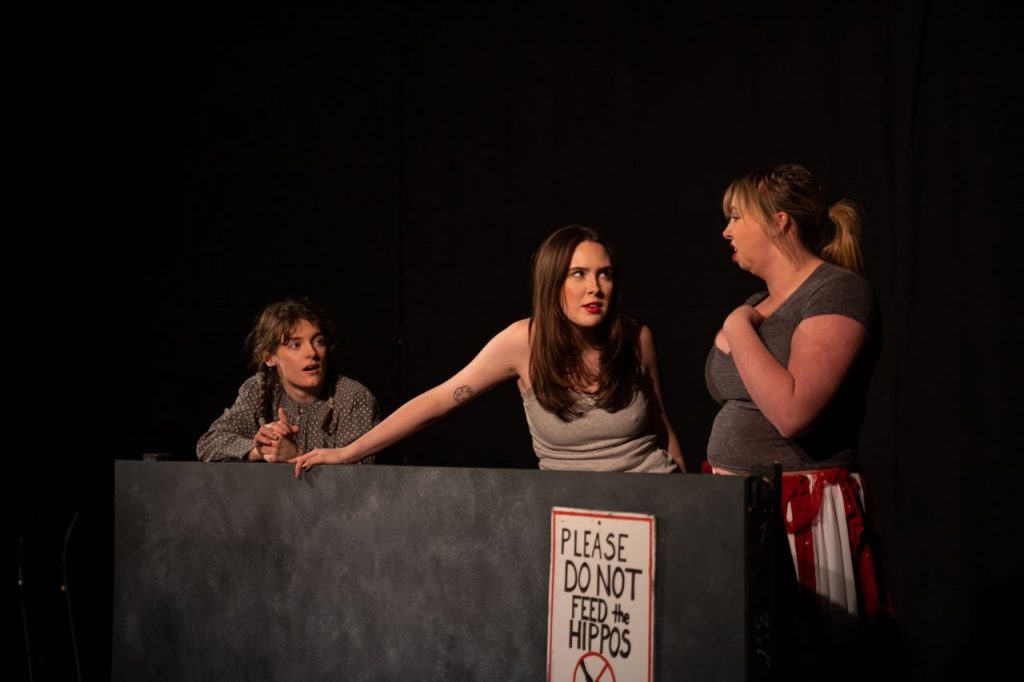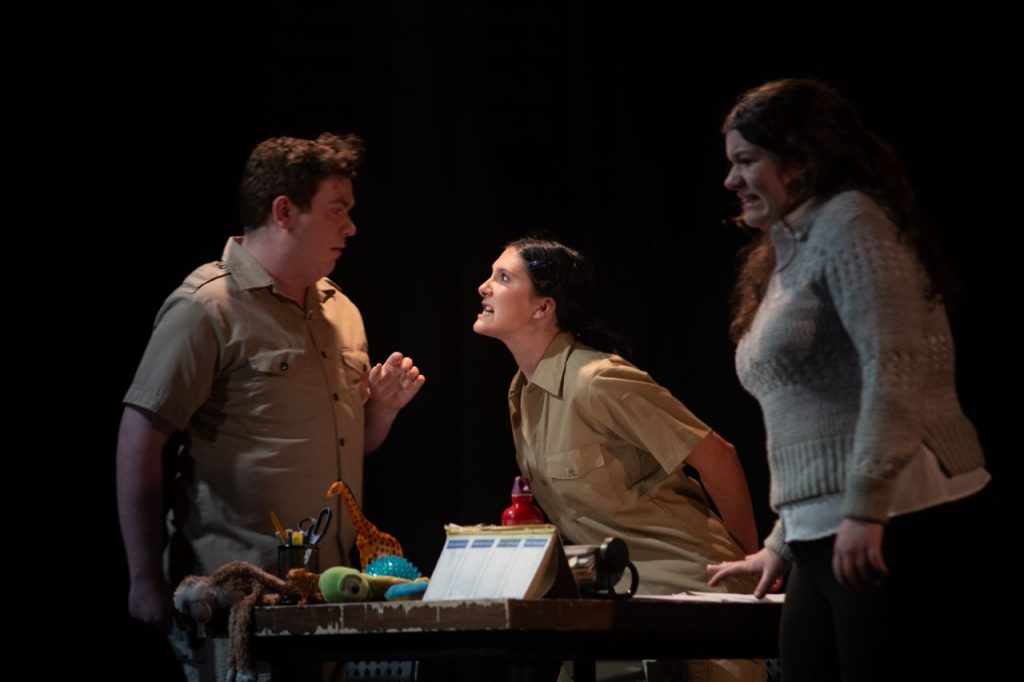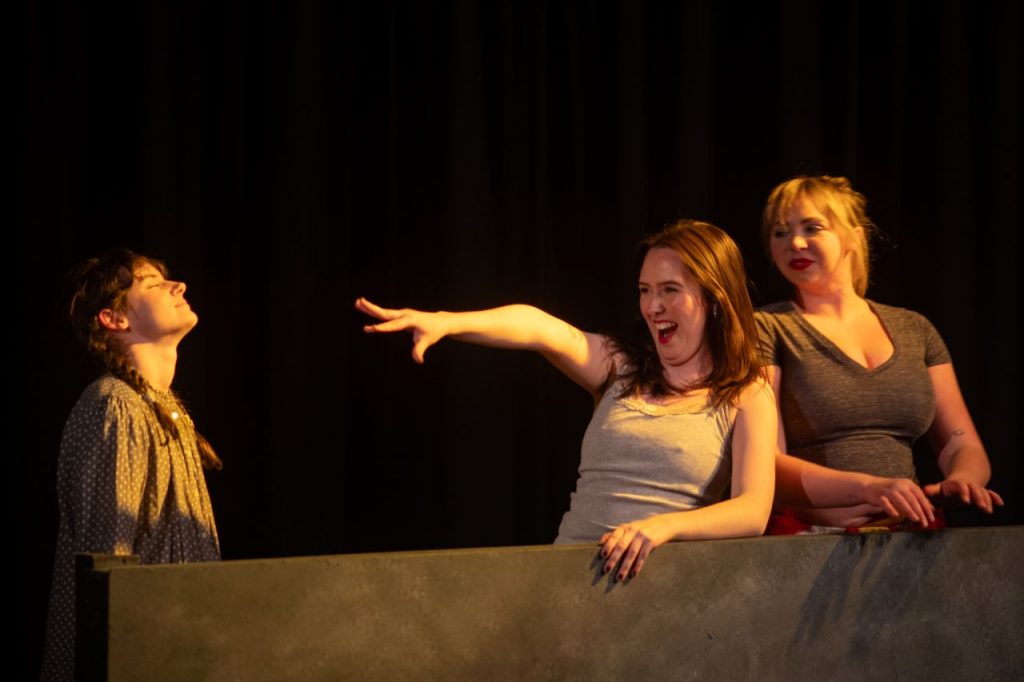BY ALLIE PAPE ’27

Hippos. Hippos who menstruate, feminine rage and empowerment, and the insatiable pursuit for power and fame; directed by Bel Kiely ‘24, our first Skidmore Theater Studio Lab of 2024 has it all. Written by Jen Silverman and a personal favorite of Kiely, Hippos of the Eastern Enclosure is an absurdist one-act comedy that addresses the cynical nature of stardom through the interactions between three menstruating hippos on Thanksgiving day. The opening scene reveals Elly (Willow Forbes ‘26), a wild zookeeper who is full of life. She is seen obnoxiously dancing and singing to Duran Duran’s “Hungry Like the Wolf” when Jacob (Ben Harris ‘27), the other zookeeper, walks in nervously and exclaims that all three hippos have gotten their period. Elly is insistent on desk duty and demands that Jacob tend to them instead of asking her, to which Jacob says no. The two share an awkward conversation about the nature of menstruation which prompts Jacob to realize that his girlfriend Sylvia (Audrey Tignor ‘27), our “girl next door,” also gets her period, an ironic anecdote that becomes omnipresent throughout the play.
A shift in setting spotlights three dynamic hippos at their enclosure in the zoo. In the center is the queen bee of the hippos Large (Sylvie Robinson ‘27), or at least as far as those in the Eastern enclosure are concerned. To her left is Large’s loyal sidekick- the show’s Gretchen Weiners- Small (Pearl Mckay ‘27). The two gossip and express their jealousy towards “that fucking caribou!” who had just been relocated to the Western Enclosure, which to the inhbaitants of the Eastern Enclosure, is practically the zoo’s Hollywood. Next to the two hippos is Spotty (Noah Greenfield ‘24), a frumpy outcast who doesn’t quite fit in with the other hippos.

Scene three commences with Elly singing, again, but this time, she’s jamming out to Survivor’s “Eye of the Tiger. Her solo-concert is interrupted by Sylvia who enters the room in a hurried state, looking for her boyfriend Jacob. Jacob’s parents have agreed to come over their place for Thanksgiving but Sylvia refuses to be by herself for when they arrive. The following conversation between Elly and Sylvia is both comedic and heartfelt, as Elly expresses her distaste for the holidays and Sylvia reveals that Jacob’s mother prefers his ex over her.
Transitioning back to the hippos, Large and Small ruminate over their desire for fame and the Western Enclosure by complaining about a female warthog who recently got to perform on a “stage”. Spotty, who slowly becomes the show’s “voice of reason”, fails to be amused by the warthog and her rise to power. Zookeepr Jacob then enters the enclosure with a bucket and mop, but his squemishness over the mensturating hippos makes it clear that he is unable to complete the job.

After Jacob leaves, the trio of hippos rotate the wall of the enclosure and break out into a dance. Dawning long white skirts, red tights, and cascading red ribbons, the hippos rap ardently about female empowerment and feminine rage, immersing the audience at once in the poignancy of their femininity and shared experience. During Spotty’s solo, the hippo repeats key feminist sentiments such as “socialism is a prison” and “all that’s missing is male permission,” which not only indicate Spotty’s maturity but also further distinguishes her from the other hippos.
Jacob returns to Elly and Sylvia admitting that he was unable to tend to the hippos because “it was a sensitive moment” for him in the enclosure. The two tell Jacob that he is afraid and that his fear inhibits him from giving the hippos the care they deserve. The play’s commentary on the irrational fears around periods is all the more relevant to the present moment, as women worldwide are mistreated due to persistent taboos around menstruation. The pair accompany Jacob to the Eastern Enclosure where Sylvia becomes interested in Spotty. As Spotty basks in Sylvia’s admiration, Large and Small start pining for her attention out of jealousy.

The play concludes with a witty and sarcastic monologue from Spotty, highlighting that success is neither a singular pursuit nor a linear journey. The fruitlessness of Large and Small’s attempts to get to the Western Enclosure reflects the losses in one’s morality as a consequence to the incessant chasing of fame.
Unlike the moral and humble Spotty, Large and Small are never recognized in the end despite their constant attempts. On the surface, Hippos of the Eastern Enclosure seems nothing more than a flippant comedy about talking hippos who get their periods. Instead, Silverman’s play reflects human nature in a multitude of ways in which Kiely, the cast, and the production team so beautifully portrayed.
Photos by Coltrane Cho ‘24
***
Allie Pape ’27 is a staff writer for the Skidmore Theater Living Newsletter
